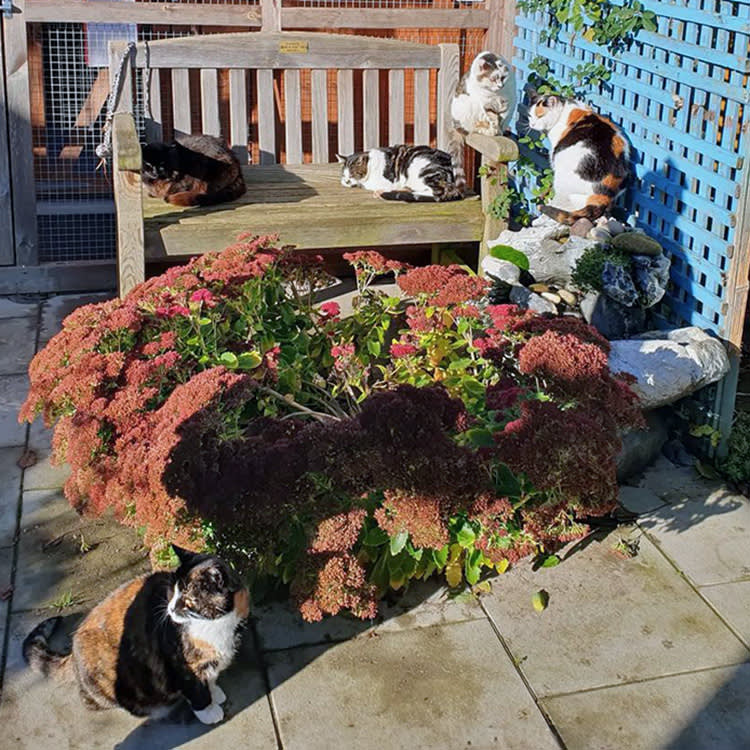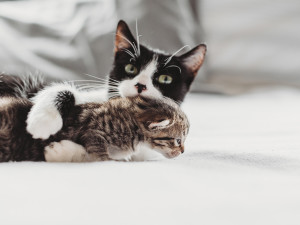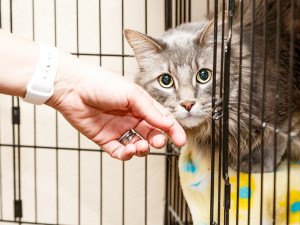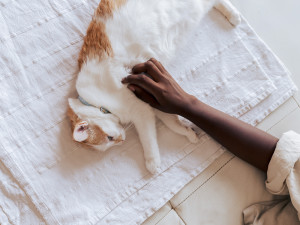Cat Retirement Homes Are a Sweet New Option for Senior Kitties
When cats’ people can’t care for them anymore, the loving staff at these facilities step in.

Share Article
In 2023, approximately 3.2 million cats entered the shelter system, per the ASCPAopens in new tab. One reason kitties often end up being available for adoption is a pretty somber one: their senior human parents have died.
Imagine being a cat and losing the person who has cared for you your whole life, only to be dropped off at a shelter where you are at risk for being euthanized if you aren’t adopted. The situation is even more dire for senior cats, who are often overlookedopens in new tab by potential adopters.
For them, the death of their person means that even if they make it to a no-kill shelter, they will likely spend the rest of their lives languishing in a cage, waiting for an adopter who may never come. And even if someone does come, there is no guarantee that person will take good care of them (though most shelters and rescues do their best to vet people interested in adoption).
Introducing the feline retirement home
Fortunately, there’s a new option for cat parents looking to ensure the health and comfort of their elderly cats if they’re no longer around to care for them: feline retirement homes. These rescues are devoted specifically to the long-term and end-of-life care of senior cats. Once an anomaly, these nonprofit facilities are popping up more and more across North America and the U.K.

In Tucson, Arizona, Hearts That Purropens in new tab cares for 31 elderly cats in a 6,000-square foot ranch home and guest house on eight acres of land. It’s dedicated specifically to helping elderly cats whose parents have died. They welcome as many cats as they can from the local community and shelters and never charge a set intake fee.
“It is set up to feel like a home rather than a shelter “with lots of windows, cat towers, rugs and furniture,” says founder and president Jeanmarie Schiller-McGinnis. “There are different areas of the main house for different groups of cats and plenty of space for peaceful kitty co-existence. We are very excited about new catios that are almost finished, which will give our feline residents lots of protected outdoor enrichment areas.”
Schiller-McGinnis opened Hearts That Purr in 2013, after years on the board of her local shelter and has since helped over 200 cats. She estimates annual care costs — vets, food, medicine, etc. — to be around $1,000 per cat and relies on a dedicated network of volunteers and a single staffer to make it all happen.
“If someone has resources to donate, we ask for something to help,” Schiller-McGinnis says. “Otherwise, it is about trying to help the human as much as the cat, so we don’t have a set intake fee.”
Planning ahead
They also welcome cats through their Feline Guardian Programopens in new tab, which allows people to register their cats with Hearts That Purr so that in the event that their cats outlive them, they know they will be taken care of. To qualify for this program, you must make an annual donation to Hearts That Purr and include a financial gift to them in your will to cover the cost of your cat’s care.
Of course, not every cat wants to live in a house full of other cats, even one as large and well-appointed as Hearts That Purr’s Tucson ranch. For these solo cats, Hearts That Purr established a unique foster program, pairing them with elderly cat lovers who don’t already have cats of their own. Hearts That Purr checks on these cats monthly to make sure they are well taken care of, pays all their bills, transports them to and from the vet, pays for their food and litter, and if they happen to outlive their new person, they find them another foster.
Not all feline retirement homes operate this way. Some function more like human retirement homes: accepting cats from perfectly healthy people, in exchange for a large one-time donation to cover the cat’s care or regular donations based on the cat’s needs. Others, like Moggie’s Retirement Villageopens in new tab at Shropshire Cat Rescue in the U.K., are part of larger, more traditional shelter systems.
Moggie’s Retirement Village currently houses 22 cats in a secure garden with six cottages surrounding a larger structure, Moggie’s Mansion, in the middle. “They come in for various reasons,” says trustee and volunteer Susie Phillips, “but the most common is due to their owners passing away, becoming terminally ill, or going into a care home.”
When new cats arrive at Moggie’s, they are secured in a cottage for one to two weeks so they can get used to the comings and goings of people and the presence of so many new cats. Once settled, they are allowed to roam the village at their leisure and choose their favorite sleep spot.
If they can’t settle, the rescue puts a special effort into finding them a home where they can be the only cat. That can be challenging, though, since so many older cats have special and chronic medical needs.
Veterinary bills alone at Moggie’s can run between 3,000 and 7,000 pounds per month, but Shropshire Cat Rescue does not charge for their services. Instead, they are fully funded by the income from their charity shop in Shrewsbury and various donations and sponsorship schemes.
“Some people leave a donation and some write us into their will,” shelter manager Marion Micklewright says. “By some miracle — probably social media — the generous public and our wonderful supporters are there to make sure the cats get whatever they need, whenever they need. We also have a sponsorship scheme whereby people can sponsor the village, individual cats, our nursery, or the main shelter.”
How to support elderly cats
Similar to Hearts That Purr, Moggie’s also allows pet parents to register their cats for care in advance in cases where separation due to death or illness is inevitable, if not imminent. “Not everyone wants to give up their pet,” says Micklewright. “Some people have no choice, and we have made numerous people very happy by keeping in touch with emails and photos of their beloved pets enjoying the garden setting in the village. Other people are so stressed about what will happen to their cat when the time comes and they take comfort in knowing that we are here to care for them.”
Of course, for all the elderly cats who charities like Hearts That Purr and Moggie’s Retirement Village take in, there are thousands more still in need, which is why it is so important for people to at least consider adopting older cats. Yes, they have more life behind them than ahead and may need more vet visits (get that pet insurance!) But as Schiller-McGinnis points out, “there is no guarantee a young cat will live a long, vet-free life either.” And there’s no doubt that a senior cat will have a lasting impact on your life. Just think: Any cat you could love that much is probably not a cat you would want to see die alone in a cage.
And if you really can’t take on the responsibility of caring for an elderly cat yourself, you can always donate to Hearts That Purropens in new tab, Shropshire Cat Rescueopens in new tab, or your local cat retirement home. Because no cat should be euthanized or live in pain and isolation simply because they are old, need a little extra care, or their primary person has passed away.
References:

Charles Manning
Charles Manning is an actor and writer based in New York City. In his free time he likes to cook, go swimming at the public pool, volunteer at the LGBTQ senior center, and foster senior and special-needs cats. His work has previously appeared in Cosmopolitan, Elle, Marie Claire, Harper’s Bazaar, Seventeen, and Nylon.
Related articles
Should I Adopt a Young or Adult Pet?
Age isn’t always just a number.
![A hand reaching towards a cat peaking out of a cage.]()
10 Questions to Ask a Shelter About an Adoptable Cat
From medical history to adoption fees to litter preferences, here is everything you need to know.
![Unrecognizable woman petting an ill cat]()
5 Common Types of Cancer in Cats, Symptoms, and Treatments
Learn how to spot the early signs to how to treat them.
![Woman with purple hair kissing the face of her chocolate brown hound dog]()
8 Comforting Thoughts to Help You Through the Death of Your Pet
There’s no guidebook to grief and loss — but these kind words will help.
![A woman in a bright yellow-orange sweater holding a striped kitten in one hand and a credit card in the other while using her laptop in front of her]()
How to Get Help With Vet Bills for Dogs Who Need Surgery
Worried about the cost of making your pet feel better? Help is on the way.




